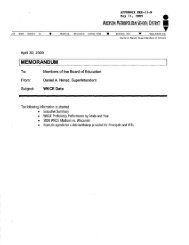interpretations of standards-based grading and reporting - School ...
interpretations of standards-based grading and reporting - School ...
interpretations of standards-based grading and reporting - School ...
Create successful ePaper yourself
Turn your PDF publications into a flip-book with our unique Google optimized e-Paper software.
Sara Hagen<br />
Underst<strong>and</strong>ing as visible in students' work [page 53]<br />
Teachers also described underst<strong>and</strong>ing using parts <strong>of</strong> the framework presented in<br />
Underst<strong>and</strong>ing By Design (Wiggins & McTighe, 2005). This framework includes the<br />
following "Six facets <strong>of</strong> underst<strong>and</strong>ing";<br />
• Explaining<br />
• Interpreting<br />
• Applying<br />
• Having Perspective<br />
• Empathizing<br />
• Self-Knowledge<br />
Teachers described assignments that target one or more <strong>of</strong> these six facets. Overall, use<br />
<strong>of</strong> the six facets was much less than the use <strong>of</strong> embodied or process metaphors for<br />
underst<strong>and</strong>ing. If teachers are to develop a shared language <strong>of</strong> criteria <strong>based</strong> on student<br />
underst<strong>and</strong>ing, more extensive conversations on this topic are needed.<br />
"Full" underst<strong>and</strong>ing: A problematic metaphor? [page 57]<br />
Because the term "full" underst<strong>and</strong>ing makes use <strong>of</strong> an embodied metaphor <strong>and</strong><br />
does not focus on an aspect <strong>of</strong> underst<strong>and</strong>ing that is visible in students' work, the district<br />
may wish to reconsider use <strong>of</strong> this term for the level 3 score.<br />
Power <strong>st<strong>and</strong>ards</strong> [page 58]<br />
Douglas Reeves (1998; 2000) coined the term "power <strong>st<strong>and</strong>ards</strong>" as the most<br />
important <strong>st<strong>and</strong>ards</strong> in a given subject or grade level. The MMSD has adopted this term<br />
for a similar concept. Teachers report a grade for each student on two, three, or four<br />
power <strong>st<strong>and</strong>ards</strong> in each subject area. In math, these are content-specific <strong>st<strong>and</strong>ards</strong> such<br />
as the ability to solve problems with factors <strong>and</strong> mUltiples, or the ability to read <strong>and</strong><br />
interpret graphs. In other subjects, the power <strong>st<strong>and</strong>ards</strong> are more general areas <strong>of</strong><br />
thinking skill such as Content Knowledge, Analysis <strong>and</strong> Application, Conducting<br />
Investigations, or Writing. The general power <strong>st<strong>and</strong>ards</strong> are used with all topics in a<br />
course, while the specific math power <strong>st<strong>and</strong>ards</strong> correspond to units <strong>of</strong> instruction. These<br />
different systems have various pros <strong>and</strong> cons.<br />
The more specific power <strong>st<strong>and</strong>ards</strong> provide more specific feedback to parents <strong>and</strong><br />
students. Parents then know for which content areas their children are most successful or<br />
need the most remediation. The broader power <strong>st<strong>and</strong>ards</strong> help teachers to focus on the<br />
balance <strong>of</strong> skills in each class. For example, the Analysis <strong>and</strong> Application power<br />
st<strong>and</strong>ard encourages Social Studies teachers to think about how their assigrunents include<br />
higher level thinking skills; in World Languages, teachers must balance oral <strong>and</strong> written<br />
communication.<br />
Power <strong>st<strong>and</strong>ards</strong> quickly become the <strong>st<strong>and</strong>ards</strong> that matter most <strong>and</strong> the categories<br />
that teachers use to think about teaching. It is therefore important to consider carefully<br />
the power <strong>st<strong>and</strong>ards</strong> that are chosen for the report card. Just as it took several years for<br />
teachers to underst<strong>and</strong> <strong>and</strong> use the <strong>st<strong>and</strong>ards</strong> documents for their areas, it will take time<br />
for teachers to underst<strong>and</strong> the power <strong>st<strong>and</strong>ards</strong>, use them in planning <strong>and</strong> assessment, <strong>and</strong><br />
explain them to parents. Teachers who helped develop the power <strong>st<strong>and</strong>ards</strong> for their<br />
Page 7



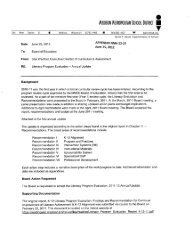
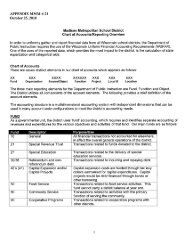
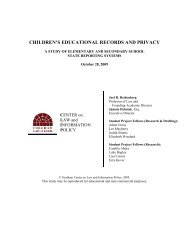
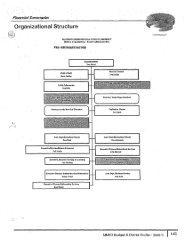
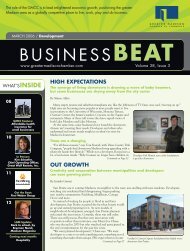
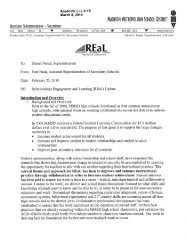

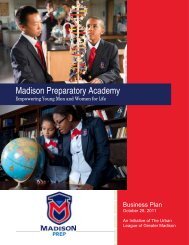
![by Shaina Wright [PDF] Ralph Waldo Emerson Prize 2006 - School ...](https://img.yumpu.com/26083584/1/174x260/by-shaina-wright-pdf-ralph-waldo-emerson-prize-2006-school-.jpg?quality=85)
